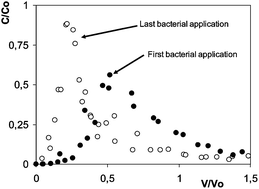 Understanding the transport of microorganisms in soil is key to evaluating the impact of releasing them into the environment through such processes as contaminated wastewater effluents. This article by Jean Martins et al. at Domaine Universitaire, Grenoble, France, looks at the mobility of E. coli, as a substitute for pathogenic cells, in undisturbed natural soil in conditions that simulate land effluent application.
Understanding the transport of microorganisms in soil is key to evaluating the impact of releasing them into the environment through such processes as contaminated wastewater effluents. This article by Jean Martins et al. at Domaine Universitaire, Grenoble, France, looks at the mobility of E. coli, as a substitute for pathogenic cells, in undisturbed natural soil in conditions that simulate land effluent application.
Most interesting is the study of E. coli cell transport using repeated injections of bacterial suspension. The majority of cells injected were recovered in the resulting effluent and the leaching of the cells from the soil occurred very quickly post-injection. The cells did not reach the whole volume of the soil. The study revealed a dual mode of fast and slow transport, the slow transport being dominant, indicating that the soil structure was gradually affected during the flow giving preferred flow pathways of bacteria. The pore network was hydrodynamically active, changing over time. The fast component of the transport appears to cancel out the effect that high salinity usually has on bacterial of aggregation as the cells didn’t aggregate, no matter what the ionic strength, and most were isolated in the soil.
It is the dominance of the hydrodynamic properties of the soil that is the important conclusion from this work. Undisturbed natural soil is recommended in experiments studying bacteria mobility if natural media is to be used due to the unstable nature of the pore structure compared to model porous media. The effects that usually dominate in model media may be overshadowed in natural media by the influence of hydrodynamics.
All of our HOT articles are free to access for 4 weeks*, so why not have a read now?
Role of macropore flow in the transport of Escherichia coli cells in undisturbed cores of a brown leached soil
Jean M. F. Martins , Samer Majdalani , Elsa Vitorge , Aurélien Desaunay , Aline Navel , Véronique Guiné , Jean François Daïan , Erwann Vince , Hervé Denis and Jean Paul Gaudet
DOI: 10.1039/C2EM30586K
*Free access to individuals is provided through an RSC Publishing personal account. Registration is quick, free and simple










